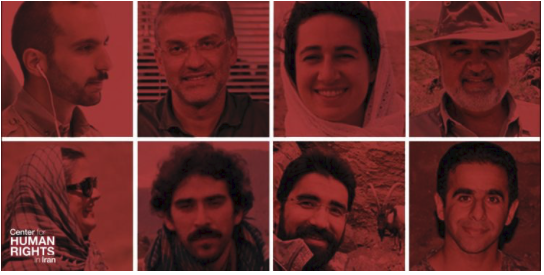
Preliminary Sentences Range Between 6 and 10 Years, Two Still Awaiting Ruling
November 20, 2019 – Six of the eight wildlife conservationists who have been detained in Iran since their arrest in January 2018 have been sentenced to prison terms ranging from six to ten years for espionage, a lawyer with knowledge of the cases told the Center for Human Rights in Iran (CHRI). CHRI has confirmed these sentences with several people with direct knowledge of the court announcements.
The eight conservationists, all affiliated with the Persian Wildlife Heritage Foundation, spent nearly two years in Tehran’s Evin Prison, with long periods in solitary confinement and often without access to lawyers, in a prosecution that has been universally condemned as an outrageous travesty of justice around the globe.
The Center for Human Rights in Iran (CHRI) condemns these unlawful and unjustifiable sentences and urges the judicial authorities in Iran to review and reject these sentences and release the six who have been sentenced as well as the remaining two awaiting sentencing.
“The authorities in Iran have given the conservationists the harshest sentences they could after two cruel years of detainment, during which time they tried in vain to find any evidence of wrongdoing,” said CHRI Executive Director Hadi Ghaemi.
“It was not these eight people who were on trial, it was Iran’s judiciary on trial, and they proved their reckless abandonment of the law, their contempt for due process, and their willingness to destroy lives and ignore international outrage over these unlawful prosecutions,” Ghaemi said.
Six out of the eight conservationists were convicted of “contacts with the U.S. enemy state” and sentenced as follows by Branch 28 of the Revolutionary Court in Tehran, according to defense attorney Mohammad Hossein Aghasi:
- Niloufar Bayani: 10 Years
- Morad Tahbaz: 10 Years
- Taher Ghadirian: 8 Years
- Houman Jowkar: 8 Years
- Amir Hossein Khaleghi: 6 Years
- Sepideh Kashani: 6 Years
The court has not yet announced its decision against fellow conservationists Sam Rajabi and Abdolreza Kouhpayeh.
Bayani and Tahbaz had also been charged with “gaining illegitimate income” but this was not mentioned in the court’s verdict and it’s not clear if they were convicted of the charge, according to Aghasi.
“We know that Niloufar Bayani has also been ordered to repay all the salaries she received from the United Nations for the several years she worked for them,” he added.
The defendants were not allowed written copies of their verdicts. They were informed of the verdicts verbally. This is a common practice in politically motivated cases in Iran, where the authorities are reluctant to facilitate transparency regarding unsubstantiated charges.
Mohammad Hossein Aghasi, a Tehran-based attorney who previously represented two of the conservationists—Sam Rajabi and Taher Ghadirian—said his former clients had told their families they had been moved from solitary confinement in Evin Prison to cells with other inmates.
“Given that the court has issued its verdict, the [conservationists] should be released on bail until the final verdict [issued by the Appeals Court],” Aghasi said. “Temporary detention is only for special cases in order to prevent contact between the suspects and witness intimidation… but none of these apply.”
“The court was supposed to issue a verdict a week after the end of the trial but it took longer and it still hasn’t decided on two of the suspects. This will probably happen on Saturday [November 23]. The verdict will be published on the judiciary’s online registry, SANA… but a written verdict will not be issued because in political and security cases, the authorities don’t want to hand anything to the suspect or the lawyers with a signature or stamp on it. Instead they take the prisoner to court and ask him/her and the lawyer to read the verdict.”
Niloufar Bayani and Morad Tahbaz have received the heaviest sentence from Branch 28 of the Revolutionary Court.
“They have sentenced Ms. Bayani and Mr. Tahbaz to 10 years in prison each. They were charged with ‘contacts with the US enemy government,’ which is punishable by imprisonment from one to ten years. They received the maximum term. We know that Niloyfar Bayani has also been ordered to repay all the salaries she received from the United Nations for the several years she worked for them.”
Aghasi told CHRI: “I was a lawyer for Taher [Ghadirian] but Judge [Abolghasem] Salavati did not allow me to be present during the trial and effectively rejected my representation. I was also a lawyer for Sam [Rajabi] but in the same manner my representation was not accepted. Nevertheless, we know from existing evidence that the verdicts are not based on solid foundations and there was no strong evidence to prove the accusations against these activists.”
“The only crimes that have been committed in relation to the conservationists are their unlawful arrest, their cruel and inhuman treatment in prolonged solitary confinement, the denial of their due process rights, and their sham convictions and sentencing, without evidence or regard for the requirements of law,” said Ghaemi.
